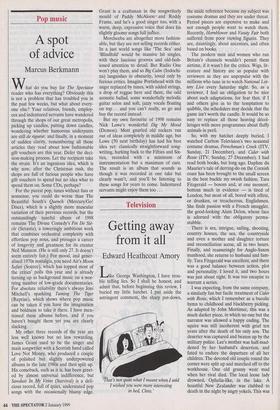Pop music
A spot of advice
Marcus Berkmann
What do you buy for The Spectator reader who has everything? Obviously this is not a problem that has troubled you in the past few weeks, but what about every- one else? Your relatives, friends, employ- ees and indentured servants have wandered through the shops of our great metropolis, picking up candles, putting down candles, wondering whether humorous underpants are still de rigueur, and finally, in a moment of sudden clarity, remembering all those articles they read about how fashionable gift vouchers are this year. Defer the deci- sion-making process. Let the recipient take the strain. It's an ingenious idea, which is why now, after the Christmas rush, the shops are full of furious people who have gift vouchers to spend but no idea what to spend them on. Some CDs, perhaps?
For the purest pop, tunes without fuss or nonsense, you could do worse than The Beautiful South's Quench (Mercury/Go! Discs), which is a slightly more muscular variation of their previous records, but the outstandingly tuneful album of 1998 remains The Divine Comedy's Fin De Sie- de (Setanta), a toweringly ambitious work that combines orchestral complexity with effortless pop nous, and presages a career of longevity and greatness for its creator Neil Mannon. (He is still only 27. It doesn't seem entirely fair.) For mood, and gener- alised 1970s nostalgia, you need Air's Moon Safari (Source), which has topped most of the critics' polls this year and is already turning up as background music on a wor- rying number of low-grade documentaries. For absolute reliability there's always Joni Mitchell's sparkling Taming The Tiger (Reprise), which shows where pop music can be taken if you have the imagination and boldness to take it there. I have men- tioned these albums before, and if you haven't bought them yet you are clearly slacking.
My other three records of the year are less well known but no less rewarding. James Grant used to be the singer and main songwriter with a Scottish band called Love Not Money, who produced a couple of polished but slightly underpowered albums in the late 1980s and then split up. His comeback, such as it is, has been greet- ed by almost universal indifference, but Sawdust In My Veins (Survival) is a deli- cious record, full of quiet, understated pop songs with the occasionally bluesy edge. Grant is a craftsman in the songwriterly mould of Paddy McAloon and Roddy Frame, and he's a good singer too, with a warm, deep, expressive voice that does his slightly gloomy songs full justice.
Morcheeba are altogether more fashion- able, but they are not selling records either. In a just world songs like 'The Sea' and `Blindfold' would be massive hit singles, with their luscious grooves and old-fash- ioned attention to detail. But Radio One won't play them, and so Big Calm (Indochi- na) languishes in obscurity, loved only by furious critics. Imagine Portishead with the angst replaced by tunes, with added strings, a drop of reggae here and there, the odd acoustic ballad, some wonderfully melodic guitar solos and soft, jazzy vocals floating on top ... and you can't really, so go and buy the record instead.
But my own favourite of 1998 remains Nick Lowe's wonderful Dig My Mood (Demon). Most gnarled old rockers run out of ideas completely in middle age, but Lowe (50 next birthday) has had his best idea yet: classically straightforward song- writing, harking back to the Fifties and Six- ties, recorded with a minimum of instrumentation but a maximum of care. The result is an album that sounds as though it was recorded in one take but clearly wasn't, and you'll be listening to these songs for years to come. Indentured servants might enjoy them too ...


























































 Previous page
Previous page